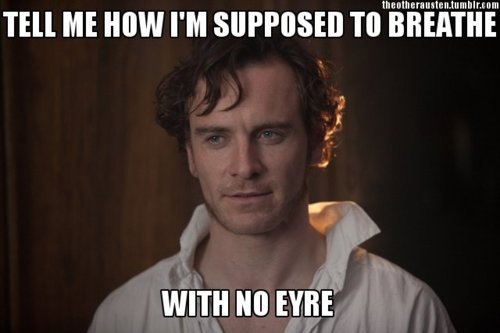 |
| I feel you, way-too-foxy Rochester. (p.s. Check out theotherausten.tumblr.com if you want some period piece hilarity and snark in your life.) |
As such, I've decided to get into the Jane Eyre state of mind by watching different screen adaptations. My favorite by a mile is the 2006 miniseries with Ruth Wilson and Toby Stephens, which, to me, captures an understanding of the novel and the characters of Jane and Rochester that no other adaptation that I've seen has. It seems like often, film adaptations get so bogged down in the Gothic doom-'n-gloom aspect of the story that it's forgotten that Jane and Rochester are both very quick-witted and snarky people. The Wilson/Stephens adaptation allows the story more of the humor and light of the novel than adaptations generally do. Also, I am just convinced that nobody (except for The Autobiography of Jane Eyre's freaking wonderful Alysson Hall) can match the absolute 100% Janeness of Ruth Wilson's portrayal.
But I am not here to discuss that adaptation! Nope, I want to talk about the one I just watched, which is the 1996 film directed by Franco Zeffirelli. It has some stuff going for it: the scenery's great, Rochester is -- true to book canon -- not a super hot hunky hunk, Adele's a wonderful gem and actually gets shown some affection by Jane and Rochester. But it also commits the e(y)r(e)ror of condensing, like, the last half of the novel into 20 minutes.
Yes, I just tried to make 'eyreror' happen. Let's all just move on gracefully past that. Unless you think it's witty, masterful, and hilarious. Then, sure, take a minute to laugh it out!
Anyway! What really got me grumpy about this adaptation is that it cut straight from the scene where Rochester and Jane profess their love to their wedding day. And all that stuff that happens in between is so important, and yet often glossed over by adaptations.
The impediment to Jane and Rochester's relationship isn't the fact that he has a secret wife up in the attic. The impediment is the fact that Rochester is the kind of person who would keep a secret wife up in the attic.
Sarah Waters, one of my very favorite writers, once said that Jane Eyre, as a novel, is marred only by the fact that Charlotte Bronte clearly liked Mr. Rochester too much. (I used this quotation in my undergrad thesis, so it's burned into my brain.) As I've gotten to know the novel better over the years, I'm not sure I would agree with that assessment.
But I definitely think that that is the reason the film adaptations are commonly lacking. Even the general cultural perception of Jane Eyre is guilty of that sin. Jane Eyre suffers a bit from Mr. Darcy-itis: despite the fact that it's a remarkable feminist novel by a female author and is rich with complex female characters, the romantic hero tends to be the foremost priority in the cultural consciousness. Jane Eyre is often described first and foremost as a love story between Jane and Rochester; for me, that doesn't quite fit. I think that before it's a love story between Jane and Rochester, it's a love story starring Jane and herself.
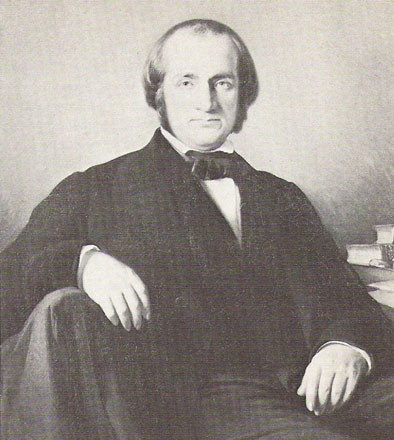 |
| Constantin Heger, smoldering your way. Do you think me handsome, blog readers? |
"Monsieur, I have a favour to ask of you; when you reply to this letter, speak to me a little of yourself, not of me; for I know that if you speak of me it will be to scold me, and this time I would see your kindly side."
and
"Tell me, in short, my master, what you will, but tell me something. To write an ex-assistant-governess (No! I refuse to remember my employment as assistant-governess -- I repudiate it) -- anyhow, to write to an old pupil cannot be a very interesting occupation for you I know; but for me it is life. Now I need another [letter] and you will give it me; not because you bear me friendship -- you cannot have much -- but because you are compassionate of soul and you would condemn no one to prolonged suffering to save yourself a few moments' trouble. To forbid me to write to you, to refuse to answer would be to tear from me my only joy on earth, to deprive me of my last privilege -- a privilege I never shall consent willingly to surrender."
The phrase "I pine away" also pops up in there.
Ouch!
My point is: there is the very obvious 'I've fallen in love with a mercurial married man!' parallel between CharBro's life and Jane's. On the surface, the story of Jane Eyre is really easy to read as, like, wish fulfillment: sure, he's married, but that bitch is crazy and she throws herself off the roof! Boom, happily ever after!
But I tend to find myself wondering (and it's very possible that finding out more about Charlotte Bronte would answer this): couldn't a huge part of her have just been pissed off at Heger for being the worst? And could that come through in Jane Eyre? If Rochester's inspired by Heger, let's not assume that everything Rochester does FOR LOVE!!!! is meant to be acceptable.
Despite the tendency toward idealizing him in reinterpretations, and often turning him into this, like, gruff but noble dude who just hangs out brooding a lot and loving Jane passionately 4eva, Rochester is not all (broody) sunshine in the novel.
Rochester is, like, a bombastic weirdo.
This guy has a LOUD personality. He is a very passionate fella, an extremely theatrical dude. It's actually one of the things I really enjoy about his character, if only because I get to laugh at his straight up wonky antics. When he broods, he doesn't settle for just sitting in the dark and being stoically anguished; Angel the vampire, he isn't. When Rochester broods, he wants to make sure that EVERYONE (or, okay, Jane) REALLY REALLY KNOWS THAT HE IS DOING IT! "HEY EVERYONE!" his weirdo speeches seem to say. "I'M BROODING OVER HERE! DON'T MISS IT! PLEASE, BE AWARE OF HOW BROODY I AM."
He's weirdly, diabolically scheming. He invites Blanche Ingram & Co. to his house so he can flirt with her and makes Jane sit there (and be ridiculed by his guests) just to make sure that she's as jealous as a person can be by the time he admits that he's still, hey, totally single and way into her. Like, come on, Rochester! that nonsense is not going to fly! If you want her, make like Gilbert Blythe and hand her a freakin' candy heart or something. Nope! Instead, he DRESSES UP LIKE AN OLD LADY FORTUNE TELLER AND TRIES TO GET HER TO ADMIT THAT SHE HAS A CRUSH ON HIM.
YOU KNOW, THE OBVIOUS ROMANTIC MOVE.
(My kingdom for a film adaptation that keeps that scene in, damn it! The Autobiography of Jane Eyre busted out a glorious modern alternative, which I will discuss on this blog someday in detail.)
The scene where he proposes to Jane starts off with him basically being all, "Hey girl, I'm gon' ship you off to Ireland to governess for some other mewling children; that's cool, right? I'm getting maaarried!" Sure, it moves into some epic romantic language toward the end there, but the fact remains.
And -- this is one of my very very favorite things about the whole book -- once they get together, Rochester starts treating Jane like his lovely little betrothed instead of his friend. (And his behavior as a friend was already pretty sketch at times.) Suddenly, Jane is this delicate, adorable little doll for Rochester to lavish with fine things and flowery praise, even though Jane's like, 'Dude, you know me. This is so not my style.'
“You shall sojourn at Paris, Rome, and Naples: at Florence, Venice, and Vienna: all the ground I have wandered over shall be re-trodden by you: wherever I stamped my hoof, your sylph’s foot shall step also. Ten years since, I flew through Europe half mad; with disgust, hate, and rage as my companions: now I shall revisit it healed and cleansed, with a very angel as my comforter.”
I laughed at him as he said this. “I am not an angel,” I asserted; “and I will not be one till I die: I will be myself. Mr. Rochester, you must neither expect nor exact anything celestial of me—for you will not get it, any more than I shall get it of you: which I do not at all anticipate.”
In Rochester's eyes, as soon as they've assumed the traditional roles of 19th century heteronormative romance, he starts seeing The Wife Who Will Be His Salvation more than he sees Jane Eyre, The Human Being. It's sad and frustrating, because the initial attraction between Jane and Rochester stems from the fact that, despite gender & class differences, they have this remarkable inherent understanding of each other. They have a shared sense of humor that leaves poor Mrs. Fairfax totally baffled. They click. Until that connection stops being as important as a more possessive, socially conventional kind of love.
Jane tells us that she rolls with Rochester's post-engagement treatment of her because she loves him -- a love that she acknowledges to be troubling and a little unhealthy. She's very good at putting Rochester back in his place, but he has so much power over her that it starts to weary her. His treatment of his "girl bride" threatens to strip her of the one thing she's always had and always striven to protect against remarkable odds: herself.
The engagement scenes take up a fair amount of time in the novel, and they drive home the fact that this relationship wasn't in a good place to begin with. It's not like the wedding day surprise of 'oh snap, there's a Mrs. Rochester in the attic!' destroys what would have been a blissful union. Bertha's existence doesn't come along and ruin what otherwise would have been all hearts and flowers forever. Bertha's existence gets Jane out of Thornfield before Rochester can affectionately smother her any more. Her departure from Thornfield is hard, so hard it almost kills her, but Jane rises up out of it with nothing and makes a life for herself. That's some pretty incredible stuff.
Here is the point about ol' Rochizzle:
Rochester is a privileged upper class gentleman who's internalized some seriously problematic -- but typical -- 19th century patriarchal crap regarding women. He genuinely believes he is being a compassionate dude by locking his wife in an attic and then talking smack about what a demon she is all the time so that people will feel bad for him. He is all about the angel/whore dichotomy. He speaks disparagingly of his string of past mistresses, and even wryly condemns Adele as a coquette in the making. He has no qualms leading on Blanche Ingram to the point where everyone is basically counting down the days 'til the wedding, and does so in good conscience because he writes her off as a gold digger (and therefore, I guess, not a human being? Another thing I love about The Autobiography of Jane Eyre: its handling of Blanche Ingram).
When Rochester describes Bertha, it's like she was a succubus who was specifically designed to, like, devour and wreck his whole existence. Dude clearly has not read Wide Sargasso Sea. Meanwhile, he talks again and again about Jane's remarkable purity, how she is good and innocent and young and sweet and will be the one to save him from his past sins.
And, like, we readers know that he's not seeing all of Jane as she truly is. He's too blinded (a ha ha; foreshadowing pun!) by what he wants her to be, the function he wants her to serve for him. We know that Jane has grappled with rage, abuse, imprisonment -- just like Bertha. We know she's not perfect, and so does she. But Rochester wants her to be perfect so badly that he just stops seeing her as she truly is.
I like that story. It's much messier than a straight up 'Girl meets boy, girl loves boy, boy loves girl, boy has first wife in attic, boy loses girl, girl comes back (and she's totally rich now!), boy and girl live happily ever after' tale. It's not the external challenges that most need to be overcome in this plot, but the internal ones. Jane needs to truly find her own strength, and Rochester needs to stop being such a freaking entitled self-pitying douchebag. Only then can they really love each other in a healthy way.
So while the Jane/Rochester love story element isn't my favorite thing about Jane Eyre, I think there's a lot to admire in the complexity of it -- but that complexity isn't always addressed, particularly in the general pop culture perception of Jane Eyre as being, like, Twilight's grandma or whatever. This novel is extremely critical of Mr. Rochester's behavior, as well it should be. Because that guy is the worst. But that's okay. In fact, it makes the story much more fulfilling than it would be if he wasn't.
SO SUCK IT, ROCHESTER!
Oh snap! You just got Eyre'd! (Gifs courtesy of kissofthespiderwoman.tumblr.com)
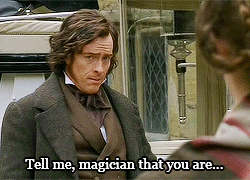

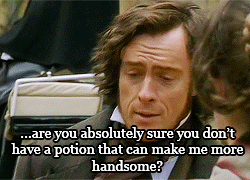
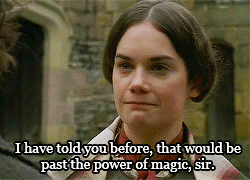
4 comments:
Spot on review. I too watch the AOJE and doing so has me questioning Rochester's attributes. I'm really looking forward to how the Blanche/Celine/Bertha relationships are handled in regards to Rochester and will it make him more of a villian.
Oh, your description of their relationship is really quite sad! Because, I mean, is it really any different by the end? Rochester is less privileged, and Jane more so, but really, what's changed about him, in the sense you describe? Jane and Rochester were always intellectual equals; at the end her inheritance solves her social inequality, theoretically. But Rochester's no more willing to "see" Jane as she really is, is he? If, as you say, he really stopped once they got engaged?
Also, hot damn, now I really need to rewatch Wilsons-Stephens. --imelda72
I really want your analysis/review/thoughts on The Autobiography of Jane Eyre. I just started watching it, ran through the whole thing in about two days, and now have to come to terms with the idea of waiting once a wk for updates. I need something more!
@ Anonymous #1:
I am so glad to hear from other AOJE fans! I'm really looking forward to it too; so far, I really appreciate that this adaptation is expressing how mercurial Rochseter is, rather than just having him be, like, a standard dreamy brooder. The Thornfield Exports party episode was just so awesome, I am still thrilled over it!
@ imelda72:
WILSON/STEPHENS FOREVER. :) I need a rewatch too!
And I didn't necessarily mean for it to be sad! Perhaps I was a tad negative. :) I think that Jane's time away on her own was what both Rochester and Jane needed to be in a healthier place about their relationship.
Even though she was in love with him, Jane was sort of under Rochester's thumb during their first engagement, in a way that was (I think) a legitimate worry for governesses: you can't really necessarily piss off the master of the house by refusing his advances, or you're unemployed with no references. I'm not saying that that's applicable to Jane and Rochester's situation, because they both wanted to be in the relationship -- but I think the relationship would be perceived by outsiders as having that sort of taint, and I think Jane sensed it too, despite her love for him.
Whereas at the end Jane is independent, and has survived on her own and doesn't need to rely on him for anything but love. She has the ability to fully choose him. And I think Rochester understands by the end that he doesn't need to dominate her in order to be with her. I think he's humbled by the loss of her and the loss of Thornfield and Bertha, and more fully accepts the equality between himself & Jane.
Sort of in that vein: I really like that Jane is always the one saving him -- not in the 'oh my angel, your purity has saved my soul!' sense, but in a very physical and practical way. In ways that would usually be the dashing hero's domain: she helps carry him over to his horse when they first meet, she saves him from the whole bed-on-fire incident, and then in the last chapter before the epilogue, the last image is him leaning on her as they walk together, in a sort of mirroring moment of their first meeting.
So that is my ultimately optimistic reading of their relationship. :)
@ Anonymous #2:
Yay, I'm glad someone's interested in reading it! I think I'll start blogging about AoJE sometime this upcoming week. Also: now there are new episodes twice a week instead of once, hurrah! I loved today's.
Post a Comment